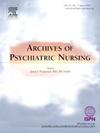Exploring healthcare professionals' attitudes towards patients attempting suicide and their moral sensitivities in emergency departments: A descriptive-correlational analysis
IF 2.2
4区 医学
Q1 NURSING
引用次数: 0
Abstract
Objective
This study aimed to investigate the relationship between moral sensitivities among physicians and nurses in the emergency department and their attitudes towards patients who have attempted suicide.
Methods
This correlational and descriptive study took place in the emergency departments of three distinct university hospitals in Turkiye. The study was conducted with 152 physicians and nurses who volunteered to participate in the research. Data were analyzed using descriptive statistics, ANOVA, independent samples t-test, bonferroni test, pearson correlation, and linear regression.
Results
Of all participants, 61.8 % (n = 91) were female; 58.6 % (n = 89) were nurses, and the mean age was 29.01 (SD = 6.94) years. The mean scores obtained by participants from the MSQ and the ASETSA were 81.93 (SD = 20.97) and 96.17 (SD = 7.99), respectively. Statistical analysis revealed a significant relationship between participants' mean score on the ASETSA and both the total mean score and dimension mean scores (autonomy, providing benefit, holistic approach, orientation) of the MSQ (p < 0.001). Moral sensitivity was found to be a significant predictor in explaining attitudes towards suicide attempts, accounting for 14 % of the variance (R2 = 0.14, p < 0.01).
Conclusion
Physicians and nurses in the emergency department who prioritize respecting the patient's autonomy, providing benefit, safeguarding the patient's integrity, and employing ethical considerations in their interactions and practices tend to harbor more positive attitudes towards individuals attempting suicide. Implementing education programs, clinical guidelines, and algorithms aimed at enhancing moral sensitivity can facilitate this development.
探讨急诊科医护人员对病人企图自杀的态度及其道德敏感性:描述性相关分析
目的探讨急诊科医生和护士的道德敏感性与其对自杀未遂患者态度的关系。方法在土耳其三所不同大学医院的急诊科进行相关和描述性研究。152名医生和护士自愿参与了这项研究。数据分析采用描述性统计、方差分析、独立样本t检验、bonferroni检验、pearson相关和线性回归。结果在所有参与者中,61.8% (n = 91)为女性;58.6% (n = 89)为护士,平均年龄29.01岁(SD = 6.94)。参与者从MSQ和ASETSA中获得的平均得分分别为81.93 (SD = 20.97)和96.17 (SD = 7.99)。统计分析显示,参与者在ASETSA上的平均得分与MSQ的总平均得分和维度平均得分(自主性、提供利益、整体方法、定向)之间存在显著的相关关系(p <;0.001)。道德敏感性被发现是解释自杀企图态度的重要预测因子,占方差的14% (R2 = 0.14, p <;0.01)。结论急诊科的医生和护士优先尊重病人的自主权,提供利益,保护病人的完整性,并在他们的互动和实践中考虑到道德因素,往往对企图自杀的人持更积极的态度。实施旨在提高道德敏感性的教育计划、临床指南和算法可以促进这一发展。
本文章由计算机程序翻译,如有差异,请以英文原文为准。
求助全文
约1分钟内获得全文
求助全文
来源期刊
CiteScore
3.70
自引率
0.00%
发文量
131
审稿时长
160 days
期刊介绍:
Archives of Psychiatric Nursing disseminates original, peer-reviewed research that is of interest to psychiatric and mental health care nurses. The field is considered in its broadest perspective, including theory, practice and research applications related to all ages, special populations, settings, and interdisciplinary collaborations in both the public and private sectors. Through critical study, expositions, and review of practice, Archives of Psychiatric Nursing is a medium for clinical scholarship to provide theoretical linkages among diverse areas of practice.

 求助内容:
求助内容: 应助结果提醒方式:
应助结果提醒方式:


